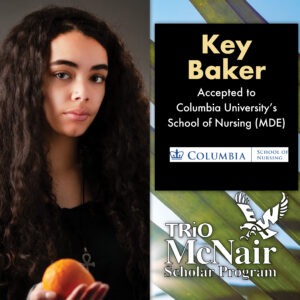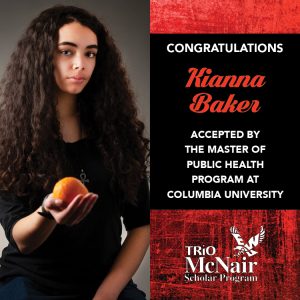
Kianna (Key) Baker graduated from Eastern Washington University in 2020 with a major in Science of Public Health and a minor in African Studies. She was selected as an EWU McNair Scholar in March of 2018 and completed her 2018-19 summer research A Study of Food Insecurity for Eastern Washington State Colleges with faculty mentors Dr. Okera Nsombi and Dr. Sarah Mount. Her career goals are to work in an urban city where she can help the disadvantaged population while teaching at a local university.
Key was accepted by the the Columbia University Mailman School of Public Health in the Department of Sociomedical Sciences where she is earning her Master of Public Health with a certificate in Child, Youth, and Family Health, where she received funding as a Public Health Special Programs Scholar and began classes in Fall 2022. For Summer 2023, Key was awarded a FORWARD Community Summer APEx Fellowship with Family PEACE. After this, she plans to pursue a PhD in Sociology.
2018-19 McNair Faculty Research Mentors: Dr. Okera Nsombi - Africana Studies; Dr. Sarah Mount - Program Director of Undergraduate Public Health, Assistant Professor Wellness and Movement Sciences
McNair Research Title: A Study of Food Insecurity for Eastern Washington State Colleges
Abstract: The purpose of this study is to identify a possible link between food insecure college Students of color and previous family household food insecurity. The USDA defines food insecurity as, “a lack of consistent access to enough food for an active, healthy life” (U.S. Department of Agriculture [USDA], 2016). The matter of food insecurity is not an anomaly, as college students around the United States are critically affected by lack of resources to access and obtain healthy foods (Bruening, Brennhofer, Woerden, Todd, & Laska, 2016; Freudenberg et al., 2011; Patton-López, López-Cevallos, Cancel-Tirado, & Vazquez, 2014). Students of color, those receiving financial aid, and working students are more likely to report signs of food insecurity (Bruening, Brennhofer, Woerden, Todd, & Laska, 2016; Chaparro, Zaghloul, Holck, & Dobbs, 2009; Freudenberg et al., 2011; Gains, Robb, Knol, Sickler 2014; Patton-López 2014; Silva et al., 2015). This issue needs attention because food insecurity is detrimental to academic performance. Students affected are more likely to report low GPAs and fail out of classes (Bruening et al., 2016; Holben, 2010; Patton-López et al., 2014; Silva et al., 2015). As far as families, Vaccaro & Huffman 2017 noted that 26% of African American households, 22.4% of Hispanic households, and 11% of White non-Hispanic households reported food insecurity (Feeding America, 2017; U.S. Department of Agriculture, 2016). There is a possible relationship between household food insecurity and college food insecurity. Living in a food insecure household may be a predictor of experiencing food insecurity in college.






